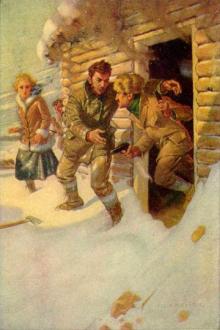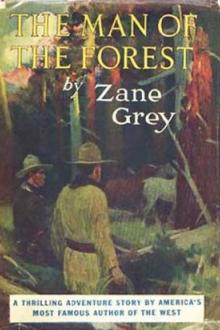Astoria; Or, Anecdotes of an Enterprise Beyond the Rocky Mountains by Irving (top romance novels .TXT) 📗

- Author: Irving
Book online «Astoria; Or, Anecdotes of an Enterprise Beyond the Rocky Mountains by Irving (top romance novels .TXT) 📗». Author Irving
After passing the Nebraska, the party halted for part of two days on the bank of the river, a little above Papillion Creek, to supply themselves with a stock of oars and poles from the tough wood of the ash, which is not met with higher up the Missouri. While the voyagers were thus occupied, the naturalists rambled over the adjacent country to collect plants. From the summit of a range of bluffs on the opposite side of the river, about two hundred and fifty feet high, they had one of those vast and magnificent prospects which sometimes unfold themselves in those boundless regions. Below them was the Valley of the Missouri, about seven miles in breadth, clad in the fresh verdure of spring; enameled with flowers and interspersed with clumps and groves of noble trees, between which the mighty river poured its turbulent and turbid stream. The interior of the country presented a singular scene; the immense waste being broken up by innumerable green hills, not above eight feet in height, but extremely steep, and actually pointed at their summits. A long line of bluffs extended for upwards of thirty miles parallel to the Missouri, with a shallow lake stretching along their base, which had evidently once formed a bed of the river. The surface of this lake was covered with aquatic plants, on the broad leaves of which numbers of water-snakes, drawn forth by the genial warmth of spring, were basking in the sunshine.
On the 2d day of May, at the usual hour of embarking, the camp was thrown into some confusion by two of the hunters, named Harrington, expressing their intention to abandon the expedition and return home. One of these had joined the party in the preceding autumn, having been hunting for two years on the Missouri; the other had engaged at St. Louis, in the following March, and had come up from thence with Mr. Hunt. He now declared that he had enlisted merely for the purpose of following his brother, and persuading him to return; having been enjoined to do so by his mother, whose anxiety had been awakened by the idea of his going on such a wild and distant expedition.
The loss of two stark hunters and prime riflemen was a serious affair to the party, for they were approaching the region where they might expect hostilities from the Sioux; indeed, throughout the whole of their perilous journey, the services of such men would be all important, for little reliance was to be placed upon the valor of the Canadians in case of attack. Mr. Hunt endeavored by arguments, expostulations, and entreaties, to shake the determination of the two brothers. He represented to them that they were between six and seven hundred miles above the mouth of the Missouri; that they would have four hundred miles to go before they could reach the habitation of a white man, throughout which they would be exposed to all kinds of risks; since, he declared, if they persisted in abandoning him and breaking their faith, he would not furnish them with a single round of ammunition. All was in vain; they obstinately persisted in their resolution; whereupon, Mr. Hunt, partly incited by indignation, partly by the policy of deterring others from desertion, put his threat into execution, and left them to find their way back to the settlements without, as he supposed, a single bullet or charge of powder.
The boats now continued their slow and toilsome course for several days, against the current of the river. The late signs of roaming war parties caused a vigilant watch to be kept up at night when the crews encamped on shore; nor was this vigilance superfluous; for on the night of the seventh instant, there was a wild and fearful yell, and eleven Sioux warriors, stark naked, with tomahawks in their hands, rushed into the camp. They were instantly surrounded and seized, whereupon their leader called out to his followers to desist from any violence, and pretended to be perfectly pacific in his intentions. It proved, however, that they were a part of the war party, the skeleton of whose canoe had been seen at the mouth of the river Platte, and the reflection of whose fires had been descried in the air. They had been disappointed or defeated in the foray, and in their rage and mortification these eleven warriors had “devoted their clothes to the medicine.” This is a desperate act of Indian braves when foiled in war, and in dread of scoffs and sneers. In such case they sometimes threw off their clothes and ornaments, devote themselves to the Great Spirit, and attempt some reckless exploit with which to cover their disgrace. Woe to any defenseless party of white men that may then fall in their way!
Such was the explanation given by Pierre Dorion, the half-breed interpreter, of this wild intrusion into the camp; and the party were so exasperated when appraised of the sanguinary intentions of the prisoners, that they were for shooting them on the spot. Mr. Hunt, however, exerted his usual moderation and humanity, and ordered that they should be conveyed across the river in one of the boats, threatening them however, with certain death if again caught in any hostile act.
On the 10th of May the party arrived at the Omaha (pronounced Omawhaw) village, about eight hundred and thirty miles above the mouth of the Missouri, and encamped in its neighborhood. The village was situated under a hill on the bank of the river, and consisted of about eighty lodges. These were of a circular and conical form, and about sixteen feet in diameter; being mere tents of dressed buffalo skins, sewed together and stretched on long poles, inclined towards each other so as to cross at about half their height. Thus the naked tops of the poles diverge in such a manner that, if they were covered with skins like the lower ends, the tent would be shaped like an hour-glass, and present the appearance of one cone inverted on the apex of another.
The forms of Indian lodges are worthy of attention, each tribe having a different mode of shaping and arranging them, so that it is easy to tell, on seeing a lodge or an encampment at a distance, to what tribe the inhabitants belong. The exterior of the Omaha lodges have often a gay and fanciful appearance, being painted with undulating bands of red or yellow, or decorated with rude figures of horses, deer, and buffaloes, and with human faces, painted like full moons, four and five feet broad.
The Omahas were once one of the numerous and powerful tribes of the prairies, vying in warlike might and prowess with the Sioux, the Pawnees, the Sauks, the Konsas, and the Iatans. Their wars with the Sioux, however, had thinned their ranks, and the small-pox in 1802 had swept off two thirds of their number. At the time of Mr. Hunt’s visit they still boasted about two hundred warriors and hunters, but they are now fast melting away, and before long, will be numbered among those extinguished nations of the west that exist but in tradition.
In his correspondence with Mr. Astor, from this point of his journey, Mr. Hunt gives a sad account of the Indian tribes bordering on the river. They were in continual war with each other, and their wars were of the most harassing kind; consisting, not merely of main conflicts and expeditions of moment, involving the sackings, burnings, and massacres of towns and villages, but of individual acts of treachery, murder, and cold-blooded cruelty; or of vaunting and foolhardy exploits of single warriors, either to avenge some personal wrong, or gain the vainglorious trophy of a scalp. The lonely





Comments (0)